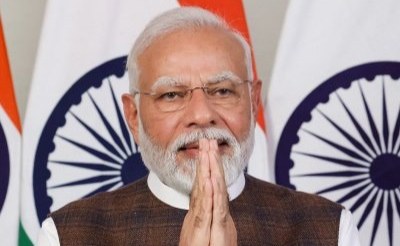Shehbaz Sharif secured his second term as Pakistan’s Prime Minister with 201 votes in parliament amid protests. Prime Minister Narendra Modi congratulated him on Twitter, and PML-N, in coalition with PPP, will lead the government.

Shehbaz Sharif secured his second term as Pakistan’s Prime Minister after attaining 201 votes in parliament, despite facing protests. In a gesture of diplomatic acknowledgment, Indian Prime Minister Narendra Modi took to Twitter to extend his congratulations to Shehbaz Sharif on Tuesday.
Also Read:- Tourist Tragedy: Brazilian Woman Gang-Raped in Jharkhand
The political landscape further unfolded as the Pakistan Muslim League-Nawaz (PML-N) formed a coalition government with Bilawal Bhutto Zardari’s Pakistan People’s Party (PPP). PML-N leader Nawaz Sharif endorsed his brother for the prime ministerial position and Sardar Ayaz Sadiq for the speaker of the national assembly role.
As part of the strategic alliance, Maryam Nawaz, the daughter of Nawaz Sharif, was appointed as the chief minister of Punjab province, making her the first woman to hold such a position in the country.
Simultaneously, former Pakistan president Asif Ali Zardari, a senior PPP leader, secured the President’s post in accordance with the coalition agreement.
Examining the broader context, the February 8 elections positioned Sharif’s Nawaz PML-N party as the second-largest, with independent candidates supported by imprisoned former Prime Minister Imran Khan’s Pakistan Tehreek-e-Insaf (PTI) clinching the highest number of seats. However, they fell short of securing a parliamentary majority.
Also Read:- Rising Political Star Lasya Nanditha’s Shocking Demise in Terrifying Car Crash
In the aftermath of the election results, the PTI-backed independents won 93 out of 265 seats in the national assembly, while PML-N, led by Nawaz Sharif, secured victory in 75 seats.
The Pakistan People’s Party (PPP) obtained 54 seats, and the Karachi-based Muttahida Qaumi Movement Pakistan (MQM-P), representing Urdu-speaking migrants from India during partition, attained 17 seats. The election for one seat was postponed due to the unfortunate death of a candidate.
This political landscape sets the stage for a dynamic interplay of alliances, negotiations, and governance in Pakistan’s evolving political scenario.
